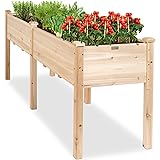Best Choice Products 72x23x30in Raised Garden Bed, Elevated Wood Planter Box Stand for Backyard, Patio, Balcony w/Divider Panel, 6 Legs, 300lb Capacity - Natural
17% OffMaple99 Raised Garden Bed with Legs 72x23x30 - Natural Cedar Wood Elevated Planter Box, Veggies, Herbs - 300lb Capacity - Natural
$124.99 (as of 15:02 GMT -05:00 - More infoProduct prices and availability are accurate as of the date/time indicated and are subject to change. Any price and availability information displayed on [relevant Amazon Site(s), as applicable] at the time of purchase will apply to the purchase of this product.)Composting is a great way to reduce food waste and create your own natural fertilizer for your garden. In this blog post, we’ll cover the basics of composting, how to start a compost pile, tips for adding ingredients to your compost pile, and using compost as fertilizer in your garden.
The Basics of Composting: What You Need to Know
Composting is the process of breaking down organic matter into nutrient-rich soil that you can use in your garden. To get started with composting, you need three things: brown material (such as leaves or shredded paper), green material (such as fruit and vegetable scraps), and water.
You also need airflow to help the decomposition process, so you should turn your compost pile regularly. This helps to aerate the materials inside and ensure that everything gets broken down evenly.
How to Start a Compost Pile and Keep it Healthy
To start a compost pile, you’ll want to choose an area that receives plenty of sunlight and has good drainage. You can build a simple wooden bin or use a plastic container with holes poked in the bottom for ventilation.
Once you have your location and container selected, you can begin layering your browns and greens together. Be sure to mix in some water to help kickstart the decomposition process.
Tips for Adding the Right Ingredients to Your Compost Pile
As you add more materials to your compost pile, be mindful about what you’re putting in there. Avoid adding any meat or dairy products, as they can attract unwanted critters and slow down the decomposition process.
Instead, focus on adding a variety of different types of materials, such as leaves, grass clippings, eggshells, coffee grounds, and fruit and veggie scraps. The key is to strike a balance between browns and greens, and to make sure everything is moist but not too wet.
Using Compost as Fertilizer in Your Garden
Once your compost has fully decomposed (which usually takes several months), you can use it as a natural fertilizer in your garden. Simply spread a thin layer over the top of your soil and work it in with a rake or hoe.
Compost is rich in nitrogen, phosphorus, and potassium – all essential nutrients that plants need to grow strong and healthy. Plus, because it’s made from organic matter, it will improve the overall health of your soil and help prevent erosion.
In conclusion, composting is a fun and rewarding hobby that can help you reduce food waste and create your own natural fertilizer. With these tips, you’ll be well on your way to creating nutrient-rich soil that will keep your garden thriving for years to come.
Related Content
- Garden Organic-useful ideas and tips
- NYSDEC on Twitter: “When you hear “composting,” do you think of a compost pile in the backyard …
- The Best Vegetables to Grow in Your Backyard This Season
- Grow The Healthy Way: Organic Horticulture Techniques
- LETTER: Reader urges people to compost, fight global warming











































